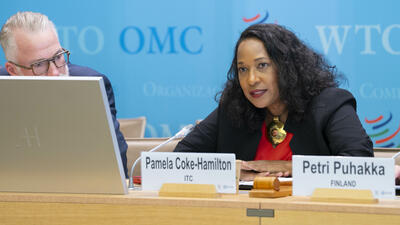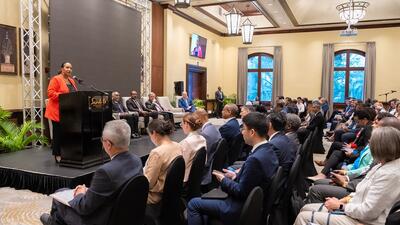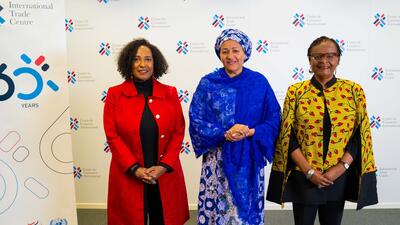
Connected services are at the forefront of economic transformation
From a refugee camp in Africa, Abubakar provides digital bookkeeping services to clients all over the world. During the height of pandemic restrictions, Felipe’s freight booking app kept essential goods moving in Latin America. From her living room, environmental consultant Liu runs a small online company that helps other small businesses in Asia turn their waste into revenue streams.
People like Abubakar, Felipe and Liu remind us that from crises come opportunities. With their entrepreneurial spirits they have created new businesses, generated jobs and provided ways to overcome some of the biggest challenges of our time – conflict, COVID-19 and climate change.
But there is something else that unites these three entrepreneurs: they provide critical services.
Services are hard to grasp. We drive, wear and sleep in products made by industry. We eat the products of the land. But services sometimes seem invisible, even though they are everywhere. This is because they are intangible. And they are increasingly incorporated into something else.
There are two trends that are reshaping services. First, they account for a growing share of the value of whatever is produced. Second, they are increasingly supplied using digital technologies.
Not all services are the same, however. A set of four activities – which the International Trade Centre has dubbed the ‘connected services’ – are at the forefront of these trends. Financial services, information and communication technologies (ICT), transport and logistics, and business and professional services are the connective tissue that links various parts of a supply chain. They are also spearheading digital innovation.
ITC has devoted this year’s edition of our flagship report, the SME Competitiveness Outlook, to these four connected services. The report finds that connected services are valuable in their own right. Employment is growing rapidly in these sectors, particularly in low-income countries. They also contribute strongly to economic growth and exports, attract investment from abroad and reinvest a large share of their revenue in innovation.
But it is their contribution to overall competitiveness that makes connected services so critical. Our research shows that firms in all sectors are more competitive when they have access to high-quality connected services.
Such services provide the key ingredients all firms need to prosper – efficient payment solutions and innovative financing, reliable digital and physical connectivity, and cutting-edge business expertise, as the businesses ran by Abubakar, Felipe and Liu illustrate.
Connected services make our societies more equal. Through connected services, small businesses, including those run by women and young people, integrate into international value chains. They adopt digital technologies to produce and engage with buyers, suppliers and support institutions more efficiently.
This way, trade becomes more inclusive, with the resulting gains more broadly distributed.
Unfortunately, however, our research shows that SMEs in developing countries do not access connected services easily, or at high quality.
It is essential for governments, business support organizations and connected services firms themselves to work to improve the competitiveness of connected services. This will lead to better services for many small firms, so they can become more competitive.
Based on our research and business surveys, our report highlights four competencies that are often lacking, but critical to the competitiveness of connected services companies. These are the ability to grow networks, innovate, deepen skills and use finance to diversify products and markets.
The report’s Connected Services, Competitive Businesses Plan summarizes key actions along these fronts. It sets out how companies can address the identified shortcomings, and how business support institutions and governments can play a critical role in ensuring that all companies have access to these important inputs.
We at ITC have stepped up our efforts to help small firms both provide and access connected services. By working with actors at all three levels – enterprise, business support ecosystem and government – we are weaving a tapestry of support that is taking small businesses online and into the global trading system.
As we rebuild, this services-led approach to development can help countries leapfrog and transform their economies. Competitive connected services can turbocharge economic transformation.

















